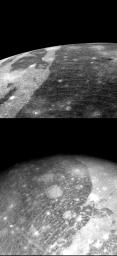Ganymede - Close Up Photos
Caption:
Two close-up photos of Ganymede, largest of Jupiter's 13 moons, were obtained on July 8 by Voyager 2 from 86,000 miles (top) and 192,000 miles. They show different views of the largest block of dark, heavily cratered terrain seen on the giant moon. The bottom image shows objects three to four miles across; has a resolution of about 1.5 miles. The light, linear stripes recurring across the dark region resemble the outer rings of the large ring structure on Callisto. If these features are in fact related to an ancient ring structure formed by a large impact, their small curvature suggests that the original structure was even larger than one seen on Callisto. There is no apparent trace now of the center of this suggested structure, which must have been destroyed by the resurfacing evident over most of Ganymede in the grooved terrain. Another interpretation is that these features are not impact-related rings but are internally produced fractures crossing the dark terrain, similar to the grooved bands.
Cataloging Keywords:
| Name |
Value |
Additional Values |
| Target |
Ganymede |
Callisto |
| System |
Jupiter |
|
| Target Type |
Satellite |
|
| Mission |
Voyager |
|
| Instrument Host |
Cassini Orbiter |
Voyager 2 |
| Host Type |
Orbiter |
Flyby Spacecraft |
| Instrument |
Imaging Science Subsystem (ISS) |
|
| Detector |
|
|
| Extra Keywords |
Crater, Grayscale, Impact |
| Acquisition Date |
|
| Release Date |
2000-05-25 |
| Date in Caption |
|
|
| Image Credit |
NASA/JPL |
| Source |
photojournal.jpl.nasa.gov/catalog/PIA02282 |
| Identifier |
PIA02282 |

